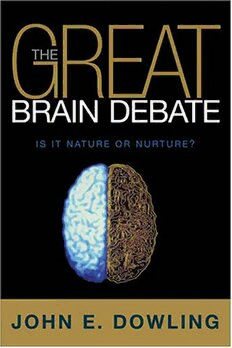
The Great Brain Debate: Nature Or Nuture PDF
199 Pages·2004·1.595 MB·English
Most books are stored in the elastic cloud where traffic is expensive. For this reason, we have a limit on daily download.
Preview The Great Brain Debate: Nature Or Nuture
Description:
How much of our behavior is determined by our genes and how much by our environment? Fiercely debated but not fully resolved, we continue to grapple with this nature-vs.-nurture question. But data from the study of the developing and adult brain are providing us with new ways of thinking about this issue -- ways that, finally, promise answers.Whether our personality, our intelligence, and our behavior are more likely to be shaped and affected by our environment or our genetic coding is not simply an idle question for today’s researchers. There are tremendous consequences to understanding the crucial role that each plays. How we raise and educate our children, how we treat various mental diseases or conditions, how we care for our elderly -- these are just some of the issues that can be informed by a better and more complete understanding of brain development.John Dowling, eminent neuroscience researcher, looks at these and other important issues. The work that is being done by scientists on the connection between the brain and vision, as well as the ways in which our brains help us learn new languages, are particularly revealing. From this groundbreaking new research we are able to gain startling new insights into how the brain functions and how it can (or cannot) be molded and changed. By studying the brain across the spectrum of our lives, from infancy through adulthood and into old age, we see how the brain develops, transforms, and adjusts through the years. Looking specifically at early development and then at the opportunities for additional learning and development as we grow older, we learn more about the ways in which both nature and nurture play key roles over the course of a human lifetime.
See more
The list of books you might like
Most books are stored in the elastic cloud where traffic is expensive. For this reason, we have a limit on daily download.
